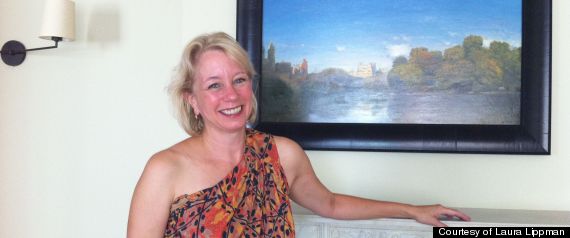
How Laura Lippman Changed Paths At
42 And Became A Bestselling Author
Posted: 09/13/2013 10:47 am EDT
What does it take to get to the top -- without
losing your center? Our “Making It Work” series profiles successful, dynamic
women who are standouts in their fields, peeling back the "hows" of
their work and their life, taking away lessons we can all apply to our own.
Best-selling author Laura Lippman
is a reporter-turned-novelist, whose best known character, Tess Monaghan, is a
reporter-turned-sleuth. Lippman spent 20 years as a journalist, the last 12 at
the Baltimore Sun, writing mysteries in her "spare time" until
finally turning exclusively to fiction in 2001 after she'd already finished
seven novels in as many years.
She didn't break pace when she
married fellow writer David Simon (the creator of such TV series as "The
Wire," and "Treme,") nor after she moved with Simon and her
step-son to New Orleans, or for the birth of their daughter three years ago,
making Lippman a first time mom at age 51. To write a book a year, she says,
you simply focus on 1000 words a day.
Why do you do the work you do?
It doesn't feel like work. Yes, I
have days that are difficult, but I'm sitting in a chair, making up stories.
It's what I did for fun as a kid, whether with Barbies or stuffed animals.
What work would you do if not this?
If I had to find a job right now,
a daunting prospect given my age, I think I would be drawn to social work. I
covered what was known as the social services beat at the Evening Sun and it
was probably my favorite beat. I just think I might actually be good at helping
people, although that could be wishful thinking.
Did you wind up in this profession by accident
or design?
Design. I set out to become a
crime writer. At first, it was because it seemed like a less presumptuous goal.
After I started writing crime fiction, I said to myself, "I may be
limited, but the genre's not. There's no reason to change genres if I'm happy
writing what I write." And I am. My work has changed a little over the
years. I'm less interested in straight-forward whodunits, although there is
some kind of mystery involved. I kill fewer and fewer people per book and it's
often off the page. But I'm a crime novelist, no doubt about it.
Who is your role model?
Hmmm. I'm drawing a big blank. It
would have to be a writer who's super-prolific but also has a big range, who
has written well into his/her, um, maturity. I'll say Donald Westlake, although
it's killing me that I can't think of a woman who fits this description. If I
say Anne Tyler people will think I'm yearning for mainstream literary success.
There's nothing wrong with yearning for mainstream literary success, but it's a
losing proposition. You'll always be looking up the mountain. So I don't caught
up playing the game in which I try to claim to be something other than a writer
in a popular genre. Some popular writers ended up being among our greatest
writers. And you know what? I"m probably not going to be thought of that
way. But we're all dead by the time this stuff shakes out, so who cares?
Is there still a glass ceiling? Have you hit
it?
That's complicated. If we judge
by sales, there is nothing holding back women writers. There are many who are
perennial best-sellers. But at the top of the top of the top, where one finds a
small number of people who enjoy financial rewards and burnished reputations --
I feel that's harder for women to achieve. Especially if they write about
women.
Do women have a responsibility to help other
women at work?
Yes. Fiction needs writers and
readers, and writers should cultivate both. But I feel a special obligation to
help women because of the issues cited above.
for the rest go here:
http://www.huffingtonpost.com/2013/09/13/novelist-laura-lippman-making-it-work_n_3790807.html?view=print&comm_ref=false
http://www.huffingtonpost.com/2013/09/13/novelist-laura-lippman-making-it-work_n_3790807.html?view=print&comm_ref=false

No comments:
Post a Comment